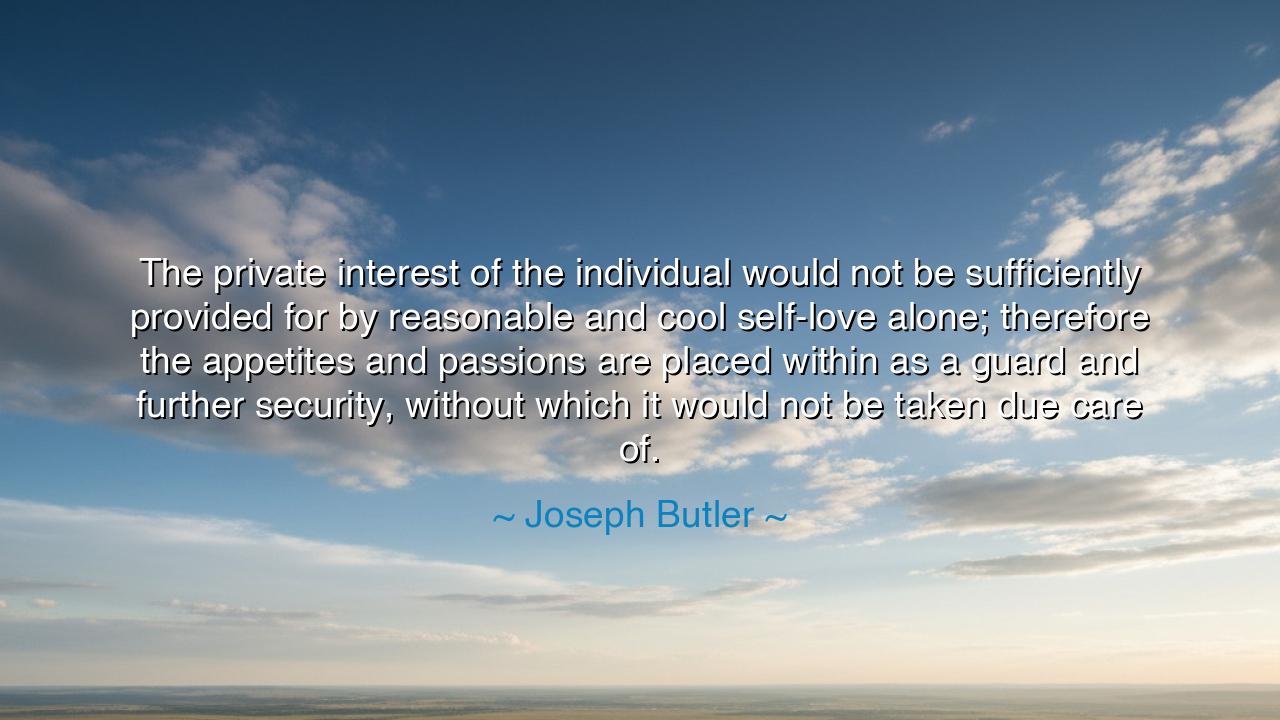
The private interest of the individual would not be sufficiently
The private interest of the individual would not be sufficiently provided for by reasonable and cool self-love alone; therefore the appetites and passions are placed within as a guard and further security, without which it would not be taken due care of.






In the labyrinth of human nature, Joseph Butler offers a profound insight into the intricate workings of the soul: "The private interest of the individual would not be sufficiently provided for by reasonable and cool self-love alone; therefore the appetites and passions are placed within as a guard and further security, without which it would not be taken due care of." In this assertion, Butler speaks to the deeper understanding that the individual’s self-preservation and self-interest cannot be guided by rationality alone. Rather, it is the primal instincts, the passions and appetites, that serve as a protective force, urging the individual toward actions that ensure survival, success, and fulfillment.
The ancients also recognized the importance of the balance between reason and passion. Plato, in his work The Republic, discussed the soul as being made up of three parts: the rational, the spirited, and the appetitive. The rational part of the soul seeks truth and wisdom, while the spirited part is driven by honor and ambition, and the appetitive part craves pleasure and satisfaction. In this vision, passion and reason were not opposites but partners in guiding a person toward a balanced life. Butler echoes this ancient truth, suggesting that without the drive and impulse of the passions, the individual might fail to act in their own best interest.
Butler’s words also reflect the wisdom of Aristotle, who recognized that human beings are driven not solely by rational thought but also by the powerful currents of emotion. Aristotle, in his ethical writings, proposed that virtue lies in the proper balance between extremes—between too little passion and too much. The appetite for food, for love, for security—these desires, while often impulsive, are critical to human life and achievement. If one were to rely only on cool self-love, the individual might become paralyzed by indecision or inaction. Butler implies that it is the emotional impulses, the very passions that sometimes seem irrational, that push us forward when reason alone would fail to act.
To understand this, we need only look to the great figures of history, such as Alexander the Great, who, driven by both reason and passion, sought to expand his empire across the known world. His strategic brilliance and intellectual prowess were indispensable, but it was his passion—his desire for glory, power, and immortality—that propelled him to the heights of greatness. Alexander knew that without his desires, his dreams would remain just that—dreams. It was his passion that transformed his reason into action, that gave him the strength to conquer lands and lead armies.
Butler’s assertion is a reminder that the self-love or rational thought alone would not propel us toward greatness. Just as the Greeks believed in the harmony of mind and body, Butler suggests that a purely rational person may be too detached, too removed from the raw energies of life to truly pursue what is best for them. Passions, like the primal forces of nature, ensure that we fight for what we need, that we desire the things that sustain us, and that we strive toward our highest potential. These instincts are the guardians of our well-being, even when they seem irrational or inconvenient.
Yet, there is a warning embedded in Butler’s words. Passions and appetites, while essential, must be controlled. The ancient Stoics, such as Seneca and Epictetus, spoke often of the dangers of being ruled by unchecked desires. They argued that while we must acknowledge our passions, we must also temper them with wisdom. Butler would agree that while the appetites and passions are necessary, they are not to be followed blindly. It is in the balance—where reason guides passion and passion fuels action—that true success lies. Butler’s philosophy is not one of indulgence, but of recognizing the role that passion plays in ensuring a fulfilled life, and using it to propel us toward our greater good.
The practical lesson we learn from Butler’s words is that we must not fear our passions, but learn to harness them. In our own lives, we must recognize the passions and desires that drive us—whether it is the love of family, the pursuit of career, or the search for personal growth—and use them as fuel for our actions. At the same time, we must temper these passions with reason and reflection, ensuring that our desires are aligned with our higher purpose. The key is not to suppress our desires, but to understand them, to channel them, and to direct them toward our highest aspirations. Thus, we live not merely as passive beings, but as active participants in the unfolding of our own destiny.






AAdministratorAdministrator
Welcome, honored guests. Please leave a comment, we will respond soon